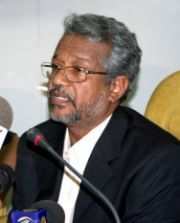Sudanese official explains how they calculated oil transportation fees
August 11, 2012 (KHARTOUM) – A Sudanese negotiator explained why some officials in Khartoum had said that the agreed price on oil transportation fees was $25.
 Sudan and South Sudan under huge international pressures to agree on a number of disputed issues they failed to settle despite the independence of South Sudan in July 2011.
Sudan and South Sudan under huge international pressures to agree on a number of disputed issues they failed to settle despite the independence of South Sudan in July 2011.
Facing a severe economic crisis, Khartoum government which is under international economic sanctions demanded an important price, $36, for the transit and exportation of South Sudanese oil. Juba refused and proposed the ¼ of the requested money.
However, the international community particularly Washington pushed Juba to agree on $9.10 for the oil produced in Upper Nile state and $11 for that of Unity state which produces some 20% of South Sudan’s oil.
However immediately after the sealing of the deal, Sudanese officials under the cover of anonymity said Khartoum got $25 per barrel hinting that Juba finally accepted to move from the small amounts proposed during the talks.
Kamal Obeid who leads Khartoum delegation in the talks with the Sudan People’s Liberation Movement –North told the official Omdurman Radio on Friday that they added the transitional financial assistance (TFA) to the average of the agreed oil transportation fees.
Juba, actually offered $3.028 billion as TFA to Khartoum in line with its previous commitments to participate with the international community to help Sudan to overcome the financial difficulties resulting from South Sudan independence.
Obeid said to calculate the TFA payment, it was agreed that Juba will pay $15 for each barrel exported during a period of three years and a half.
So when you add $10, which is the average of oil transportation fees to $15 of TFA you will get $25, the Sudanese official said.
While Khartoum remained silent over the agreed price, Pagan Amum, South Sudan top’s negotiator immediately released a statement in Juba to say that his government made little concessions to Khartoum on the issue.
Juba proposed $7.20 and accepted $9.10 for Petrodar oil. It also offered $9.16 and accepted $11 for FGPOC oil as a compromise proposed by the mediation, he said.
Sudan’s foreign ministry explained two days later that its delegation accepted the offer proposed by the mediation and left the venue of the talks.
Sources say the chief mediator Thabo Mbeki personally discussed the issue, by telephone, with the South Sudanese president and got his approval during the night.
Washington said US State Department Secretary Hilary Clinton who met President Kiir in Juba on the same day pressed him to accept the deal.
The parties have to resume soon the discussions over the unresolved issues as the implementation of the oil deal remains linked to an agreement over security matters.
Khartoum is under pressures to accept the African Union map to establish the buffer zone, but it wants a clear commitment from Juba to stop its support to the rebel groups.
Juba denies backing the Sudanese rebel groups but admitted they show sympathy and solidarity with their cause.
(ST)
